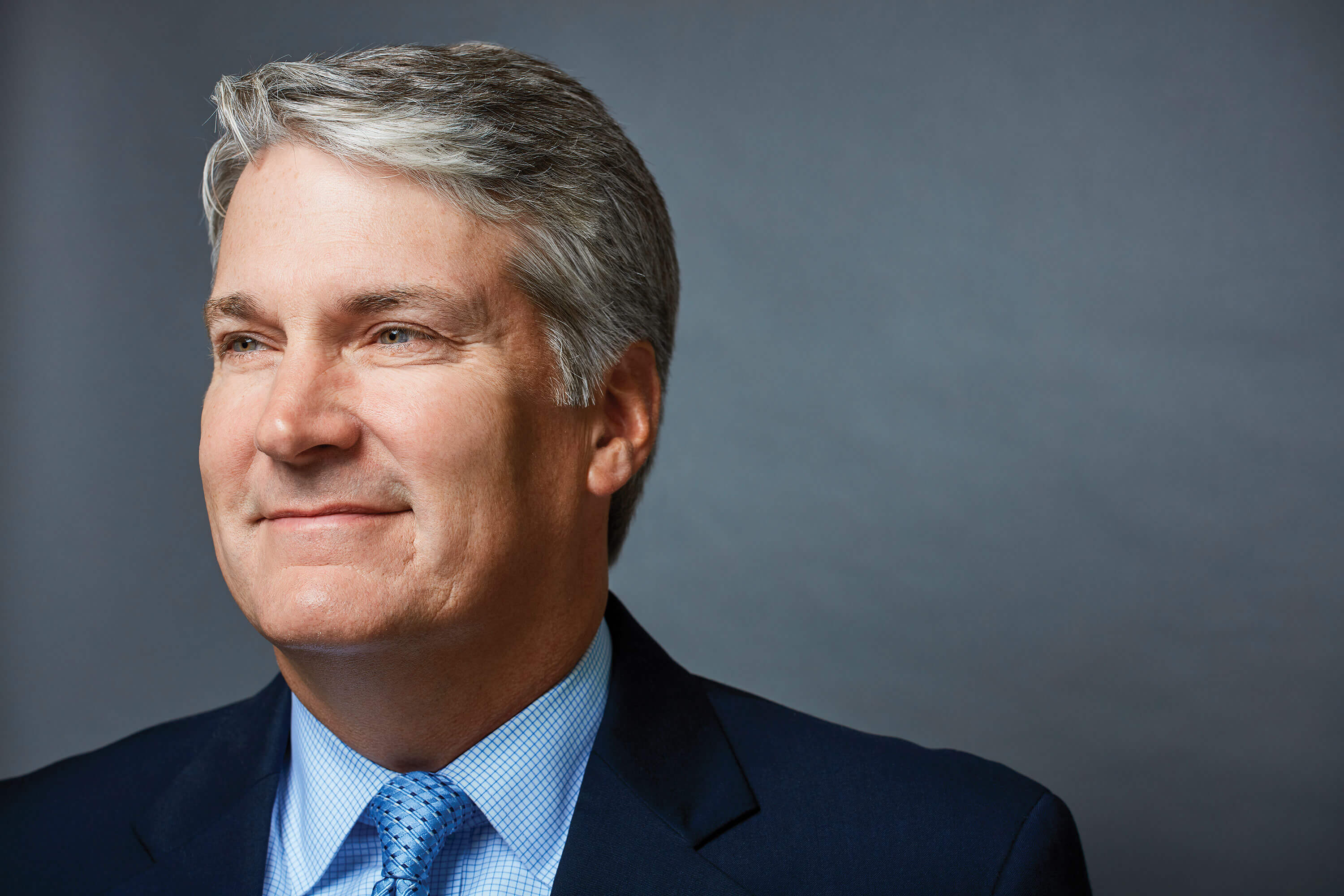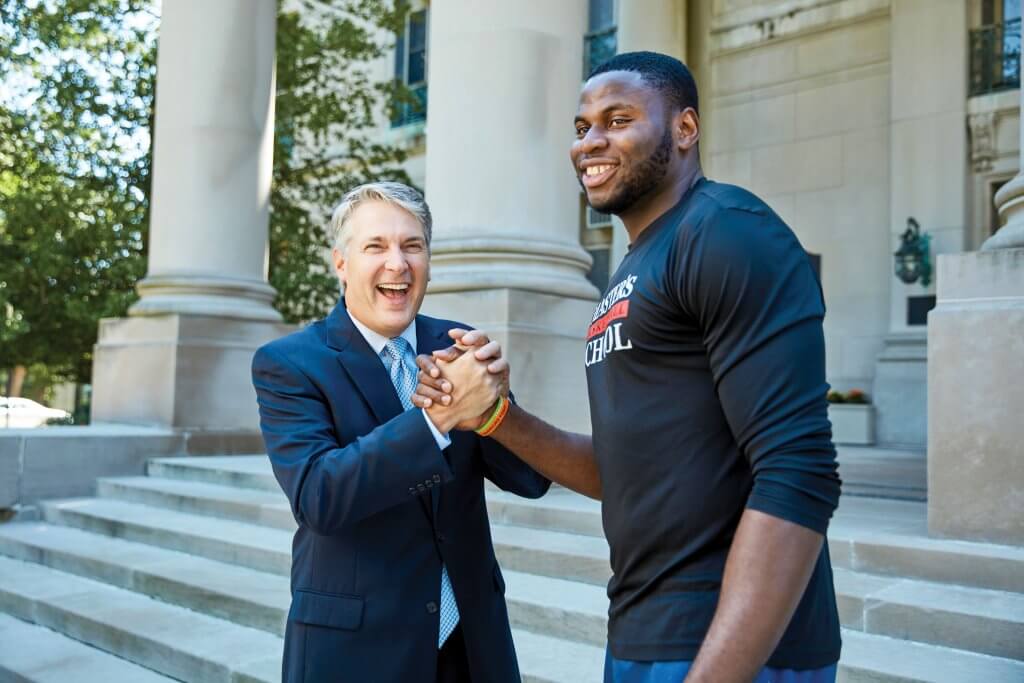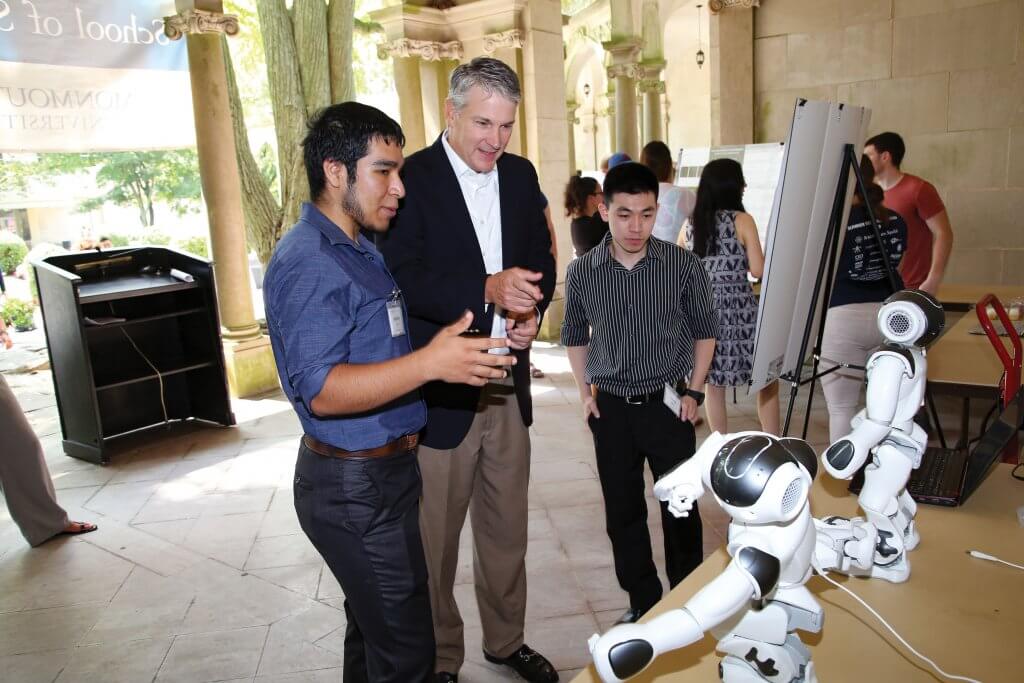
Prescient President
Patrick F. Leahy, Ed.D., took office on Aug. 1, 2019, brimming with unbridled optimism about this University’s future and greeted by a meeting schedule so jam-packed it could make anyone’s head spin. Luckily, the latter could do nothing to subdue the former for Monmouth’s 10th president.
Leahy came to Monmouth from Wilkes University in Pennsylvania, where during a successful seven-year presidency he led an expansion of that university’s academic and extracurricular offerings that culminated in the one-time junior college achieving doctoral university status. No stranger to success, Leahy also spearheaded a nine-figure capital campaign while serving as vice president of university relations at the University of Scranton, and before that, cofounded and served as president of a 15,000-member distance learning community.
When we met with Leahy, four days into his tenure at Monmouth, he expressed little interest in talking about his past accomplishments and was focused instead on the unparalleled potential he sees in Monmouth University.
What have your first few days in office been like?
It’s been a whirlwind, but one that I welcome and I’m enjoying immensely. I’ve been introducing myself to people whom I didn’t have the chance to meet during the transition, and with those whom I had met before, we’re starting to take the conversations to the next level. So it’s been wonderful.
Thinking back to last year at this time, before you were selected as Monmouth’s 10th president, what was it that excited you about the opportunity to lead this University?
It was a combination of two things. One was the rich history of this institution, which as you know started in the throes of the Great Depression as a junior college to provide academic opportunity to students from this region who could not otherwise access it, and has evolved into a university committed to making a first-class, private education accessible to students who are deserving.
The second was the untapped potential I saw here—from the broad program mix, which I feel positions Monmouth to serve student interests going forward, to the University’s location, to the many different assets the University supports that, I feel, can bring increased recognition to Monmouth in the future.

You’ve worked in higher education for a number of years. I’m wondering if there was anything you noticed about Monmouth that struck you as unique?
What I found so interesting is you take what is a really fine academic institution—and I’ll say more about that in a moment—and then you add to it the Division I sports program, which gives us a chance to compete with universities across the country and bring exposure to what we’re doing. Add to that the Polling Institute, where—and I’ve said this to others before—I’d be sitting in my living room in Wilkes-Barre, Pennsylvania, and hearing repeatedly on cable news the latest polling coming out of Monmouth University. That’s a unique opportunity to shine a light on this fine academic institution. And there is also the Urban Coast Institute and the Kislak Real Estate Institute, two academic enterprises that are making real contributions in terms of research and community outreach. And, of course, there is The Bruce Springsteen Archives and Center for American Music, which obviously brings significant exposure to Monmouth. My point in saying all of that is that most colleges and universities around the country would give anything for one of these opportunities—and we have all of them and more.
And let me say just one thing about the underlying institution. I have a saying, which people will probably hear repeatedly from me: Great people make great universities. That’s because this is such a human-service enterprise. And what was most attractive to me about Monmouth was the quality of the people I met throughout the search and the transition period—people who are deeply committed to student success.
How will you be spending your first semester?
Visiting with every constituency of this University and asking them some fundamental questions about their Monmouth experience, what they think makes Monmouth unique, and what they see as the challenges we need to face as an institution going forward. I’m going to be showing up everywhere, but I will be seen more than I’m heard in this first semester.

You mention challenges, and some of the ones facing private institutions such as Monmouth seem daunting: changing demographics, public concerns over the cost and value of a college degree—are there others?
Those are certainly the most significant. Now I don’t say this to alarm anyone, but in the coming decade, American higher education faces challenges that I’m not sure this industry has ever faced. And while I do have ideas from my experience on how this institution can face them, one thing I know for sure is that the only way we’re going to thrive is if we all work together. That includes all constituencies of the University: the board, faculty, staff, administrators, students, alumni, donors, and members of the local community. We all have to band together, and if we do that, then the future for this University is incredibly bright.
With regard to the changing demographics, what do institutions like Monmouth face?
This part of the country is going to see the greatest demographic decline in traditional high school graduates who want to matriculate into college. So for institutions like ours that right now rely on enrolling X number of 18-yearolds, it’s going to get incredibly competitive. The Northeast also happens to be the part of the country with the most high-quality, well-respected, and, in some cases, wealthy institutions. So, you put those things together and that’s a challenging market. You’ll have to try to get more students to travel to your location, because if you just serve those around you, the demographics are against you. And it will be hard for colleges and universities to differentiate themselves among the 5,000 or so other higher education institutions in the country.
What you said before about Monmouth’s “untapped potential”—does that give you a degree of confidence that Monmouth is prepared to face these changes?
Yes. We need to shine a spotlight on this place so that people across a much wider area will understand the marvelous things that happen here. We have opportunities to do that here that thousands of colleges and universities across the country just do not have. All those things we talked about that make Monmouth special and unique make me think we can break out of the pack. And it’s because my predecessors and the community made those investments in the past to set us up for that.
And one thing I’ll add—the demographic changes we’re talking about are high school graduates. There is still a huge market for adults in this country who have some college credits and would like to finish their degree. There is also a significant global demand for higher education. The question is, can Monmouth reach out to those markets somehow? It’s an open question, and until I’ve had a chance to dialogue with all of my constituents, I’m not about to say yes or no. But there are things to think about if we’re willing to expand our horizon a bit.
Getting back to the other challenges, do news reports of the public’s concern over the cost or perceived value of a college degree concern you?
The ticket to a better life in America is still, by far, getting a quality bachelor’s degree, and maybe someday getting a quality graduate degree so that you can continue to enhance your credentials and get a better job. So my worry is not that fewer people will choose to go to college. It’s that people will choose to trade off the value they get at a medium-sized private university like ours to go to a huge public institution simply because it’s less expensive.
When you make a buying decision, what you want is the highest value option available. Some people equate low cost with high value. But value is a function of two things: One is the cost, of course; the other is what you’re getting for your money. Every time you’ve purchased something, whether you’re conscious of it or not, you’re making a value judgment. And I would argue that what prospective students and their families need to look at with Monmouth is, though we may not be the lowest-cost alternative, what we provide, through a careful integration of investments in quality and being careful about price, is the highest value option in our market. That’s a very important distinction.

You’ll be meeting with many alumni as you settle in to your new role, but for those with whom you might not yet have spoken, what message would you share with them?
That I hope they’ll be a team of ambassadors that can help tell the Monmouth story more widely. What an institution like ours needs, almost as much as anything, is positive exposure. Their willingness to mentor Monmouth students; to interview our students for jobs; to talk about, in a positive way, their Monmouth experience in the networks of which they’re a part—that’s all an important part of getting the Monmouth story out and getting this institution the exposure it deserves. It builds value in the Monmouth degree and, in turn, adds value to alumni degrees.
You mentioned Monmouth’s founding as an institution that gave area high schoolers access to educational opportunities they might not otherwise have had during the Great Depression. Do you see the University continuing to play a role in the development of the local community?
Absolutely. We have an obligation to continue to be a significant contributor to the economic, cultural, and social development of our host community. By virtue of the fact that we do business here, we bring a ton of spending into the area. We offer all of our art shows and productions and other cultural events. And through our research institutes and service learning initiatives, we’ll continue to move the needle so that, in the process of educating our students, we can figure out ways to improve the social situation in our community.
You’ve spoken before about a commitment to the liberal arts being essential to a university’s success. Why is this so important for you?
You can’t be a true university without an enduring commitment to the arts. In my mind, the very nature of the term university implies a commitment to the sciences and the arts, to professional programs and liberal arts programs. There are communication and critical thinking skills that you learn, and perspectives that you gain through your required humanities courses that will make you a better nurse, scientist, business professional, or math teacher. I wouldn’t feel so confident in making that case if I wasn’t myself a product of it.

I read that your father, four brothers, and sister all worked in business. Was there an expectation you’d follow the same career path?
After finishing my undergraduate degree, I stayed at Georgetown and worked in development. But I had people encouraging me to pursue a career in business. So, I listened to others, and for eight years or so I followed a more traditional business path—working in finance and sales, getting my MBAs. I don’t regret it. In fact, I think now how fortunate I was to have those experiences because I use them every day in my work. But what I really always wanted to do was work in higher education. I always tell students I took a circuitous route to landing in the career of my choice, and one of the lessons there is I shouldn’t have let other people influence me. There’s only one voice that students should listen to, and it’s that voice deep inside each one of them. That’s the most authentic voice, and it took me a few years to listen to mine.
When you were announced as Monmouth’s president, you thanked University of Scranton President Scott Pilarz for his role in helping you return to your career of choice. What has his mentorship meant to you?
I think what mentors do for their pupils, if you will, is they believe in you in a way that you don’t believe in yourself. They give you opportunities that, in a funny kind of way, you may or may not think you deserve or have not yet earned. But because they believe in you so much, they give you opportunities to perform. That’s what Scott Pilarz did for me. I don’t have the chance to be a university president without him.
What personal accomplishment are you most proud of?
Probably earning my doctorate from the University of Pennsylvania while working full time and having four children, ages 1 to 7, at home. Frankly, it makes me think they should have given my doctorate to my wife, Amy.
How is your family adjusting to the move?
We love this location. I have roots in New Jersey, because for the past 43 years, I’ve been spending every summer at the Jersey Shore.
What was the first thing you unpacked in your office?
I’m not sure. [Looks around, then laughs.] I jumped in so eagerly I haven’t unpacked anything yet.
Do you have any hobbies?
I love golf, but I don’t know if I can refer to that as a hobby, because in order to count it as one I’d have to do it some minimal number of times a year, and I don’t get many chances to play.
What’s your strategy for balancing the demands of a 24-7, 365-days-ayear job with the responsibilities that come with being a husband and father of four?
One of the great privileges of being a university president is I have the opportunity to integrate my work life and personal life. My wife gets invited to a lot of University functions. I can take my kids to athletics and arts events, or walk my dog on campus, and in a way cover both my commitments to my family and my job. Not every organization head is afforded that opportunity.
Another one of my mentors, a highly successful business executive, once told me you can do two things in life really well, but it’s hard to sometimes fit that third thing in. His point was, you can be totally engaged in your job and be a great father and husband. But if you commit to those two, it might crowd out that third—let alone a fourth or fifth. So, if I never push my golf handicap any lower, I’ve made peace with that.
Last question: If you bumped into a prospective student right now, what would you say to convince them to come to Monmouth?
We have a program mix that allows you to explore whatever your interests are. We have a physical plant that is second to none. And we have a culture of dedication to student success that is not easily replicated at other institutions. Do yourself a favor and take a close look at Monmouth.